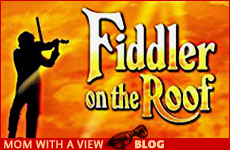 Iran’s Attack on Israel
Iran’s Attack on Israel


3 min read
7 min read
4 min read
4 min read
Why don't more people view this show as a searing tragedy?
In Herman Wouk's "The Winds of War," the leading character's wife is portrayed as a nasty shrew and I found myself rooting for him to have an affair with his much more pleasant co-worker. When I saw how my emotions could be swayed in favor of an illicit relationship, a relationship that is abhorrent to me both personally and morally, I told myself, No more. This type of story is not good for my soul.
I felt the same way when a friend recently sent me an advertisement for the revival of the Broadway musical, "Fiddler on the Roof" -- starring Topol, no less.
"Fiddler on the Roof" has come to hold a warm and sentimental role in the hearts of Diaspora Jewry. Yet despite the clever lyrics and beautiful melodies, it's really the story of a tragedy.
And I'm not even referring to the whitewashed and glorified presentation of shtetl life in the mythical town of Anatevka. Mythical it is for sure. Poverty has never looked so good. And dancing with the Cossacks? That's an image victims of their raging and murderous pogroms must have shuddered to watch.
There was so much pain in Jewish life then and there (hence the vast immigration to America) that it's hard to look at those stylized images and not cringe.
But that's not the truly tragic part. While some view the movie or play and applaud the dawning of a new era -- daughters choosing their spouses without any regard to their parents' wishes of the ties of tradition, I see the destruction of the Jewish people. I see the lack of education and the inability of the parents to convey why it matters. And I weep.
Watching performances of "Fiddler on the Roof," it's easy to get swept up in the story and to sympathize with the daughters in their quest to follow their own paths. That's why it's destructive. That's why my children have seen "The Sound of Music" about 150 times and "Fiddler on the Roof" not once.
The show evokes an empathy with the girls that is confusing and damaging. I've spent my whole adult life trying to teach the beauty of our heritage, trying to demonstrate why it's so precious, trying to show what's worth holding on to.
What kind of evening's entertainment can it possibly be to attend a performance that shows how easily that it can all be swept away? And presents that choice as a good one?
The eldest daughter marries a boy of her own choosing as opposed to that of her parents. In the movie, her parent's pick is presented as totally inappropriate and the idea of parental involvement in this area mocked as foolish. This invalidates a whole culture where children respect their parents, recognize their wisdom and turn to them for help in choosing a prospective mate.
The middle daughter marries a boy who has renounced his relationship to Judaism and has become an ardent Communist. In the storyline, the father, Tevye, learns to accept this turn of events.
The third and youngest daughter goes to the farthest extreme and marries a non-Jew.
We never stop loving our children. But that doesn't mean we accept and validate all their actions and choices. Especially the ones that fly in the face of everything we hold dear.
To be charmed by a show that implicitly endorses intermarriage is something I think I may be immune to. Even my emotional involvement in the lives of the characters can't quite get me there. But I don't even want to risk the possibility.
Pop culture has a profound effect on our values. Is this "little girl I carried" continuing the Jewish tradition of her ancestors? If not, what is there to sing about?
